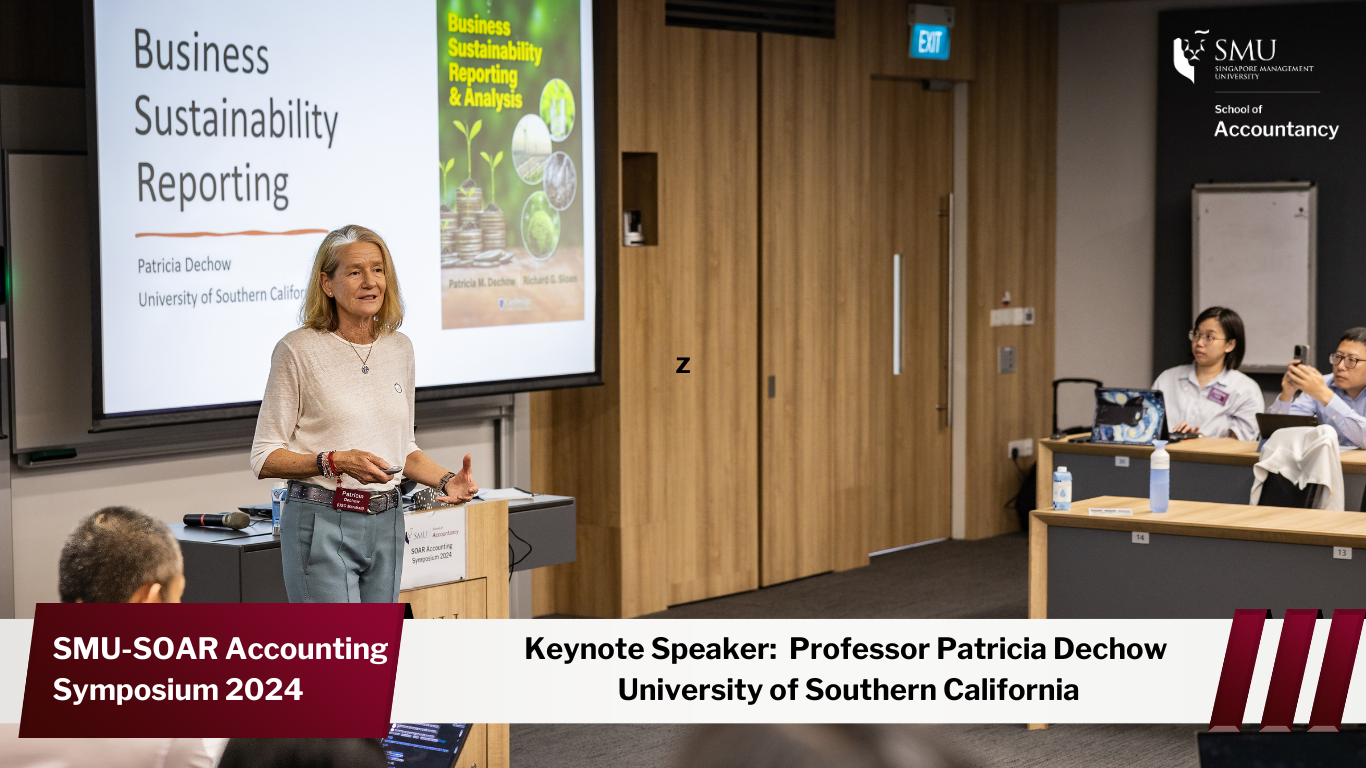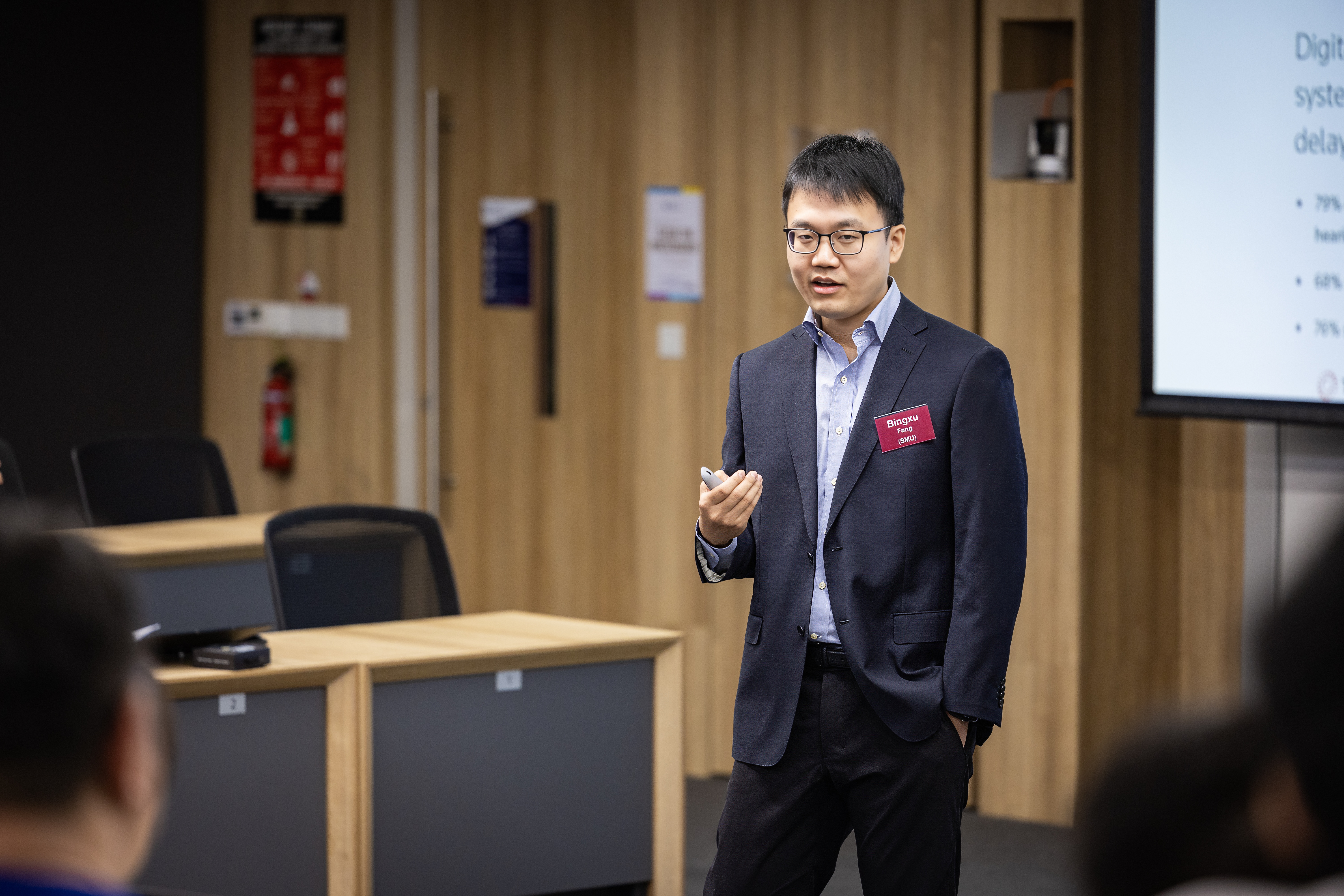
The SMU School of Accountancy Research (SOAR) Accounting Symposium was recently held from 18 to 19 December 2024, gathering some of the top minds in the field with over 140 papers submitted, of which seven were selected to be presented at the symposium.
The SOAR Symposium connects researchers from SMU and other leading institutions of higher education with peers to exchange groundbreaking ideas. Each presentation ignites in-depth discussions, allowing researchers to receive constructive feedback and refine their work for publication.
In his opening remarks, Professor Liandong Zhang, Deputy Dean of SMU School of Accountancy (SOA) said: “A lot of the research we see has important policy implications, and I hope we keep seeing such research submitted to SOAR.”
Such impactful research that makes a difference in society is something that SMU has consistently focused on as part of its vision to address societal challenges.
The organising committee prioritised diverse research and global perspectives when selecting papers for this year’s rendition of the annual symposium. The seven studies curated for presentation represent a spectrum of critical issues in accounting, with authors hailing from around the world.
Understanding the shortfalls of current sustainability reporting

The two-day symposium was kicked off with an illuminating keynote speech by Professor Patricia Dechow from the University of Southern California’s Marshall School of Business.
She dove into the complexities of sustainability reporting through the lens of game theory. Using thought experiments like the prisoner's dilemma, Professor Dechow demonstrated how self-interested actions by organisations can lead to negative outcomes, particularly on a global scale where environmental costs such as pollution are often borne by communities, rather than the companies.
Professor Dechow also addressed the flaws in existing sustainability reporting, such as when emissions are double counted or estimated, resulting in largely inaccurate numbers. Rounding off her speech, she touched on how groups like the E-liability Institute are trying to create an ecosystem for more rigorous carbon accounting, proposing the tracking of carbon emissions throughout the process of creating an inventory, for instance.
The impact that judicial efficiency has on frivolous litigation cases
Among the papers presented at the symposium was one by Assistant Professor Bingxu Fang from SMU SOA. Titled “Judicial Efficiency, Frivolous Litigation, and Voluntary Disclosure”, the paper was co-authored with Professor Sterling Huang from New York University – Shanghai, and SMU PhD in Accounting candidate Weiqi Liu.
This research explores the impact of a more efficient judicial process on shareholder class action lawsuits. Specifically, it examines whether improvements in efficiency influence the risk of frivolous lawsuits and how this affects company disclosures.
Existing studies suggest that shareholder litigation cases, when targeted at misconduct, can act as an effective governance mechanism for firms and help protect investors. However, many of such lawsuits turn out to be frivolous. Moreover, the lengthy and expensive nature of the legal process often compels firms to settle out of court. The authors therefore wanted to understand if a more efficient judicial process had a positive or negative impact on the number of frivolous lawsuits.
To do so, the authors examined the period between 1997 to 2007, during which US federal courts progressively replaced a labour-intensive paper-based case filing and management system with a more efficient electronic Case Management (CM)/Electronic Case Filing system.
“We found that the adoption of the CM system is associated with a 21 per cent reduction in frivolous litigation risks” said Professor Fang, going on to explain that this reduction in incidence of frivolous lawsuits was also found to lead to enhanced voluntary disclosures by firms.

These findings contribute to existing literature by providing empirical evidence on the impact court efficiency has on deterring frivolous lawsuits, which in turn is an enabler for shareholder litigations to act as a more effective governance mechanism for genuine misconduct by firms.
How third-party verification improves carbon accounting quality
The final paper presented at the symposium looked at the role of third-party verification on carbon accounting quality. Dr Holly Yang, Associate Professor of Accounting at SMU SOA served as the discussant for this paper.
Assistant Professor Shawn Shi from the University of Washington Michael G Foster School of Business presented on behalf of his co-authors, Associate Professor Brandon Gipper and PhD candidate Fiona Sequeira from the Stanford University Graduate School of Business.
By measuring carbon accounting quality based on the deviation of reported emissions from the expected level, the authors found that the presence of third-party verification or assurance improved the quality of carbon accounting reports. Furthermore, this association is strengthened by more thorough and pervasive assurance.

The findings underscore the need for stricter frameworks to improve carbon accounting quality. This research also contributes to the growing body of knowledge on audits in non-financial terms and paves the way for further exploration in this field.
Professor Yang highlighted that the paper tackles relevant issues faced by regulators around the world, such as whether disclosure of direct and indirect emissions (Scope 1, 2 and 3 emissions) in ESG reporting should be mandatory.
Rounding off her discussion, Professor Yang said: “This paper is a joint test of the carbon accounting quality measure as well as assurance quality, but both are still, to some extent, black boxes in literature. There’s a lot more for future researchers to add [to this area of research].”
